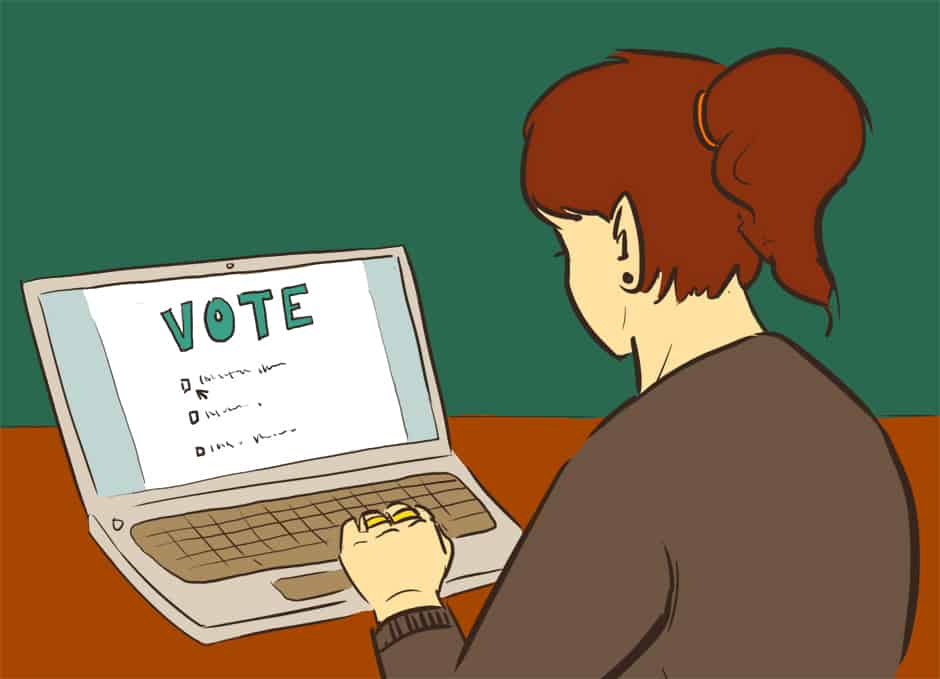An investigation into the effectiveness of online voting in University of Toronto Students’ Union (UTSU) elections may be on the cards, following concerns over the cost of online voting systems, the high number of spoiled ballots, and voter turnout.
Online voting was implemented for the first time last year in an October 2013 by-election, and again in its elections in March 2014. The UTSU Annual General Meeting (AGM) recommended that the Committee consider online voting in 2012–2013 following years of divisional lobbying.
At a meeting on August 21, the Elections and Referenda Committee (ERC), a standing committee of the UTSU, touched on the issue of online voting. Naveed Ahmed, UTSU director for UTM, said that that the committee should consider reverting to a paper ballot system.
Yolen Bollo-Kamara, UTSU president, maintained that it would take a significant investigation before making the decision to change the voting system.
“We do not believe any of these arguments justify the removal of online voting,” said Connor Anear, Kaleem Hawa, and Tina Saban, student leaders at Trinity College, in a joint statement.
“The top priority at the UTSU should be transparency, because of the amount of student money they handle,” said Teresa Nguyen, president of the U of T Engineering Society (EngSoc).
EngSoc produced a report in 2010 requesting the implementation of online voting in a bid to change the UTSU’s electoral practices, improve democracy, and increase transparency.
Bollo-Kamara said that the discussions were still in the early stages, and more investigation would be required before making any decisions.
“This was the first meeting of the committee, and was called primarily to set dates for the fall by-elections and initiate the hiring of a Chief Returning Officer (CRO). Any discussion at this point is very preliminary…The ERC will discuss further what such an investigation could look like, before undertaking any decisions,” said Bollo-Kamara.
“Now may be a good time to evaluate the outcomes of online voting after two elections,” Bollo-Kamara added.
Anear, Hawa, and Saban recognized the importance of conversations about online voting, but expressed concern at the timing. “We believe that revisiting the issue only one year after it was approved by students and implemented into the electoral process is premature and unnecessary,” the student leaders said.
“I feel like they’re almost banking on how student organizations don’t have institutional memory when they are presenting this again, just because it really is the same conversation,” said Nguyen.
“I’m a little taken aback with why [online voting] is even an item of discussion for the UTSU, because I believe they are aware that many students express frustration with how they handle their electoral reform,” she added.
In May 2013, Jill Matus, vice provost of students, issued a statement in response to the fee diversion referenda in which Trinity College, the EngSoc, and Victoria College voted in favour of diverting fees from the UTSU to their respective student councils. “[O]n-line elections are an essential feature of open, accessible and democratic operation,” the statement said.
The statement indicated that, if online voting was not available for the 2014 elections, the clause in the “Policy for Compulsory Non-Academic Incidental Fees,” with respect to the withholding of student society fees, would be applied.
The UTSU reiterated that the discussion thus far centered around launching an investigation into the effectiveness of online voting, and not on removing it. “As there has been no discussion about removing online voting, [the statement] has not been considered. However, the union is accountable to our members, and should discussions of this nature continue, their interests will be our utmost priority,” Bollo-Kamara said.
At the conclusion of the UTSU elections in March last year, the Chief Returning Officer (CRO) recommended that online voting no longer be used. At the meeting of the ERC, Bollo-Kamara said that the CRO’s report should be considered carefully.
“At this point, I am solely interested in the prospect of further investigation into the voting system with the goal of increasing voter engagement in UTSU elections, and evaluating the pros and cons of the current system,” Bollo-Kamara said.


